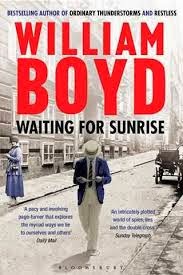I have never been more confused or disappointed by a book than when I read Waiting for Sunrise by William Boyd.
The novel begins kind of, well, brilliantly. Or at least interestingly. Part 1 is based in Vienna, 1914, where we are introduced to the dashing Lysander Rief, an actor, whose fame is mostly thanks to his father who was a world-famous stage actor in his time. Rief forsakes all his engagements in England, including a fiancee, to come to Vienna in order to avail himself of the new 'talking-cure', or psychotherapy, for his sexual problem. The opening of the novel offers a detailed, sympathetic portrait of Rief and his struggle with 'anorgasmia' (i.e. no orgasm) and really delves into the original cure proscribed by his doctor. Boyd conjures up a charming, bohemian pre-war Vienna with skill and ease. We see Rief adopt to a new culture, meeting new people, and falling in love. Behold, his anorgasmia is cured. Being a good man, Rief breaks things off with the fiancee (although everything is not as simple as it seems) and invests in this exciting relationship.
Ah, I thought, this is good. This is a book about the birth of psychotherapy, about the London theatre world in 1914, about love, strife, the outbreak of war and Rief struggling with his own sexual inhibitions, his personal traumas.
Not so. Um, no, says William Boyd, I've had enough of all that human emotion stuff. Can't be bothered with that nonsense. Let's give them an old-fashioned, tried-and-tested World War spy thriller.
Not only is it secretly a spy-thriller, which, frankly, came out of nowhere and slapped me across the face, but the story is ponderous, boring, badly-stitched together and, yes, even clunky. I can't imagine any good crime novelist ever allowing such a plot to grace their desktop for more than a day. There are so many loose ends you can weave a tapestry from it. (Why is every person in the 'spy cell' related to Rief in some way? Why are the MI5 bosses so damned suspicious? Why did they fake Rief's death, only to have him turn up a few months later, no questions asked? What about Rief's SON for crying out loud? Also, he's supposed to impersonate a 'Swiss engineer', but he's not even German - how could he impersonate a Swiss-German accent?)
It's as if the spy-thriller is still smarting after the wholly different Part 1 and it takes a while for Boyd to adapt to the new pace. He sacrifices a few things, too, which should have stayed. For instance, the quality of language. Descriptive gems, like calling the trenches of the First World War "a meandering doodle" and, on finding a spy in Geneva:
The phrase 'searching for a needle in a haystack' came pessimistically into his head.Also, Rief inconsolable after his mother's suicide:
I sit in 3/12 Trevelyan House with a bottle of whisky and a cheese-and-pickle sandwich I bought from the pub on the corner of Surrey Street.And cliched dialogue:
'Why did it all go so wrong for us, Lysander?'
'It didn't go wrong. Life got in the way.'
'And now the war's got in the way.'
The most unforgivable thing, however, is the changing Rief. Rief - who can't cheat on his fiancee without breaking things off with her 'properly'; who still adores the woman whose lies put him in jail; who cries for the son he'll never see - suddenly starts blowing people up and torturing them for information. You can sense Boyd has hit an impasse after one particularly disgusting torture scene involving metal scrubbers and teeth. Boyd has Rief squeamish - no blood! no gore! - which is supposed to be a sign of mercy, but what he ends up doing to his victim is pure horror. And he does it twice. And he hardly understands the reason why he's doing it either.
If this had been a spy-thriller from the off, or if Rief had been portrayed as a flawed hero like James Bond, I wouldn't have minded. The problem here is that Boyd wants it all: the English gentleman - kind, loving, handsome, thoughtful, even a little timid - and the shrewd and cunning assassin, whose one step ahead of everyone he knows, even the reader.
The novel doesn't please anybody. It reaches some kind of uncomfortable compromise (mass-market appeal I guess?) between people who like to read mystery novels and people who like to read historical dramas and literary fiction. But it wouldn't exactly be a great book in either category. It's a confused, sloppily-concluded novel, and I'm glad that I've come to the end of it so I can read something else....

No comments:
Post a Comment